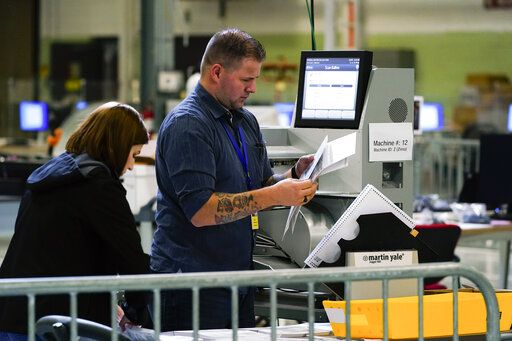Mishaps, distrust spur Election Day misinformation
Election workers process mail-in-ballots for the midterm elections in Philadelphia, Tuesday, Nov. 8, 2022. (AP Photo/Matt Rourke)
Voters casting ballots in Tuesday’s pivotal midterms grappled with misleading claims about glitchy election machines and delayed results, the final crest of a wave of misinformation that’s expected to linger long after the last votes are tallied.
In Arizona, news of snags with vote tabulators spawned baseless claims about vote rigging, which quickly jumped from fringe sites popular with the far-right to mainstream platforms. It didn’t matter that local officials were quick to report the problem and debunk the theory.
In Pennsylvania, election officials pushed back on baseless claims that delays in counting the vote equate to election fraud. But the conspiracy theory spread anyway, thanks in part to Donald Trump, Ted Cruz and other prominent Republicans who have amplified the idea.
There was lots of other misinformation too: false claims about ballots cast by non-citizens or dead people; hoaxes about voting machines that automatically change ballots and tales of suspicious Wi-Fi networks at election offices.
The states and facts involved were all different, but most of the misinformation aimed at voters this year had the same drumbeat: American elections can no longer be trusted.
“People were looking for things to go wrong to prove their preconceived notions that the election was rigged,” said Bret Schafer, a senior fellow at the Alliance for Securing Democracy, a Washington, D.C.-based nonpartisan organization that tracks misinformation. ”And there are always things that go wrong.”
If 2020 is any guide, many of the claims the emerged Tuesday will persist for days, weeks and even years, despite efforts by election officials, journalists and others to debunk them.
Three was a sharp uptick in social media posts Monday and Tuesday claiming Democrats would use delays in vote tallying to rig elections throughout the country, according to the SITE Intelligence Group, a firm that tracks disinformation.
Some of the posts originated on websites popular with supporters of former President Donald Trump as well as adherents of the baseless QAnon conspiracy theory.
The increased popularity of mail ballots is one reason why results can take a while. In key battleground states like Pennsylvania, Michigan and Arizona, election officials cannot begin counting mail ballots until Election Day, guaranteeing delays.
“We have never certified an election on election night,” said Sheryl Albert, director of elections for Common Cause, a non-profit group that has been tracking election misinformation. “This is nothing new. It’s just people trying to undermine faith in elections.”
Misinformation about voting and elections has been blamed for a widening political divide, decreased trust in democracy and an increased threat of political violence like the Jan. 6, 2021 attack on the U.S. Capitol.
The same false claims fueled the campaigns of several prominent candidates who reject the outcome of the 2020 election, including Republican gubernatorial candidates Kari Lake in Arizona and Doug Mastriano in Pennsylvania.
Though not on the ballot, Trump helped spread many of the leading false claims on Tuesday. Using his TruthSocial platform, he amplified the conspiracy theories from Pennsylvania and Arizona. “Another big voter tabulation problem in Arizona,” he wrote. “Sound familiar???”
The false claims seen in 2022 are likely to stick around and become part of the misinformation facing voters in the presidential election, said Morgan Wack, a University of Washington disinformation researcher and part of the Election Integrity Partnership, a collaborative research group focused on election misinformation.
“We will almost certainly see this again in 2024,” Wack said.
Most major social media platforms announced plans to combat election misinformation and provide voting resources to users. It was a different story on fringe platforms like Gab, where misinformation and even threats of violence were easy to spot Tuesday.
Twitter was of particular concern to disinformation researchers given its new owner, Elon Musk, a self-described free speech absolutist who has spread misinformation himself.
One analysis of bots and fake accounts on Twitter found a significant increase in discussion of election fraud in the week before the election. The number of automated or fake accounts posting about “stolen elections” doubled in the sample reviewed by researchers at Cyabra, an Israeli tech firm.
Officials with the Department of Homeland Security’s Cybersecurity and Infrastructure Security Agency said Tuesday they were monitoring for foreign attempts to sow doubt about the election but saw no evidence the efforts were paying off.
Russia, China and Iran have all mounted disinformation operations targeting U.S. politics and will likely increase their efforts ahead of 2024, according to Craig Terron, director of global issues at Insikt Group, a division of the Massachusetts-based cybersecurity firm Recorded Future.
Terron said the Kremlin likely sees such meddling as justified, given U.S. support for Ukraine following Russia’s invasion.
“Immediately after the US midterm elections, and into 2023 and beyond, the Russian government will very likely attempt to plan and execute malign influence efforts,” Terron wrote in an email to the AP. “In particular, we expect to see campaigns aimed at undermining the next two years of President Biden’s term.”
___
AP writer Haleluya Hadero contributed to this report from New York.
___
Follow the AP’s coverage of misinformation at https://apnews.com/hub/misinformation. Follow the AP for full coverage of the 2022 midterm elections at https://apnews.com/hub/2022-midterm-elections and on Twitter at https://twitter.com/ap_politics. And check out https://apnews.com/hub/explaining-the-elections to learn more about the issues and factors at play in the midterms.
Copyright 2022 The Associated Press. All rights reserved.


